Table of Contents
As a former blogger, there’s a special place in my heart for software that makes my job easier. Recently, ChatGPT has been the talk of the town as the new tool on the block. Artificial intelligence is relatively new to the field of marketing, so it makes sense that many professionals are excited about this new tool. However, I would like to offer my two cents on using ChatGPT for SEO, which seems to be an unpopular opinion.
As with any new technology, there are advantages and disadvantages. To me, the disadvantages significantly outweigh the potential benefits. Using ChatGPT is not worth the risk.
In this article, we’ll cover:
- What ChatGPT is and its rise to popularity
- Why is ChatGPT so controversial?
- Can you use ChatGPT for SEO? How are SEO professionals leveraging it?
- 3 ways ChatGPT can penalize your website (and why you shouldn’t use it as of right now)
What Is ChatGPT?
ChatGPT stands for Generative Pre-trained Transformer, and the prototype was launched by OpenAI on November 30, 2022. This ultimate chatbox received heaps of attention on Twitter, LinkedIn, and other platforms due to its ability to produce answers that seem to be written by a human.
According to The Wall Street Journal, OpenAI is valued at $29 billion due to venture capital forms’ interest in investing in the startup. OpenAI has worked on other artificial intelligence software that captured the interest of big companies such as Microsoft.
Why All The Hype And Controversy Surrounding ChatGPT?
Overall, many newspapers and journals viewed ChatGPT as an overwhelmingly positive point of view.
However, there are still implications for ChatGPT. Important topics regarding academic plagiarism, cybersecurity, and the ethics of AI are called into question.
We’ll talk more about the controversy below. But first, to better understand why you shouldn’t use ChatGPT for SEO yet, it helps to understand how certain SEO professionals are leveraging this tool.
Can You Use ChatGPT For SEO?
SEO professionals rely on a lot of software to do their jobs, so to me, AI isn’t a surprising next step for this area of digital marketing.
Through reading OpenAI’s article on ChatGPT, I brainstormed several ideas on how to use ChatGPT for streamlining your SEO efforts.
4 Ways SEO Professionals Are Leveraging ChatGPT For SEO
Here are how SEO professionals are using ChatGPT to speed up their SEO processes. Many of these professionals have taken to posting to social media and their blogs.
There are so many ways ChatGPT can be used, but here are the 4 most common ways I’ve seen and experimented with.
1. Content Creation And Strategy
Since ChatGPT replies to your questions or comments, content creation is used for SEO many professionals are trying out.
Content writing takes a lot of time, and it costs a pretty penny to be fully researched and SEO-optimized. ChatGPT cuts a lot of the turnaround time down.
So instead of spending your company’s resources getting blog content, ChatGPT can use artificial intelligence algorithms to piece together content. Additionally, it can put together a content strategy for your niche.
Below, we’ll talk about how using ChatGPT for this isn’t a good idea.
Here are two queries I typed into ChatGPT. I asked for an article outline on silk pajamas and then asked for the information to be arranged in a table. This is good, organized information a company could write an article about.
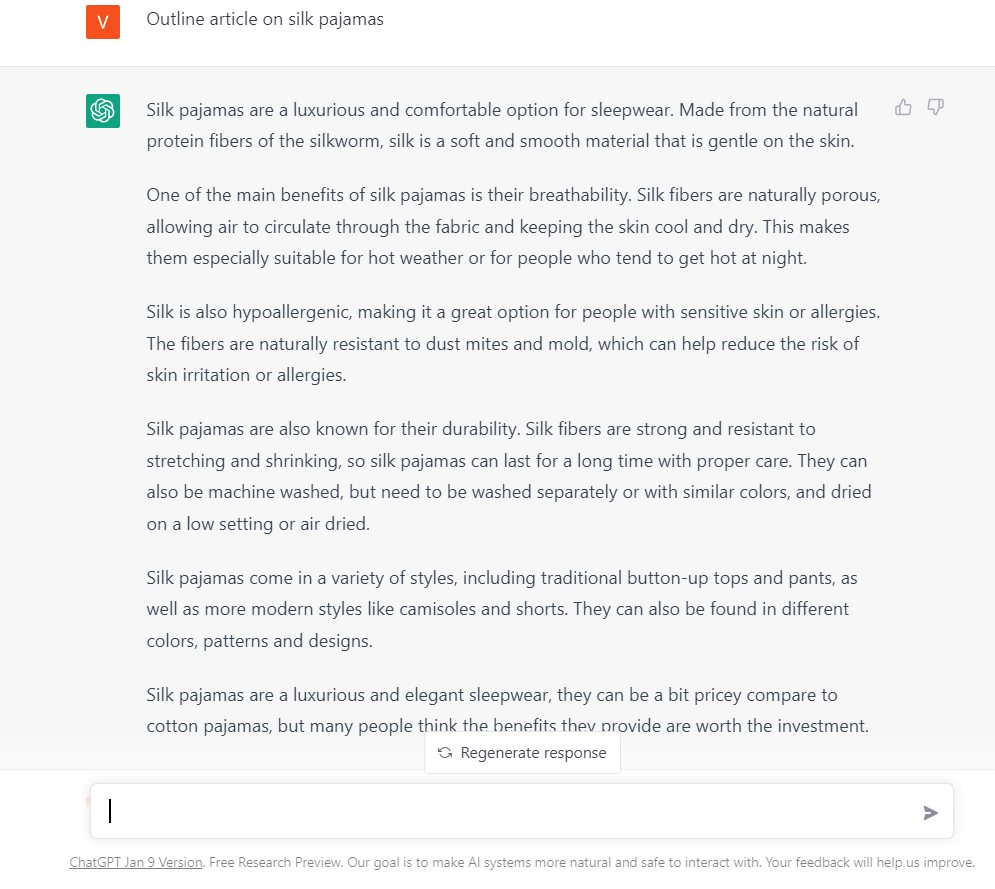
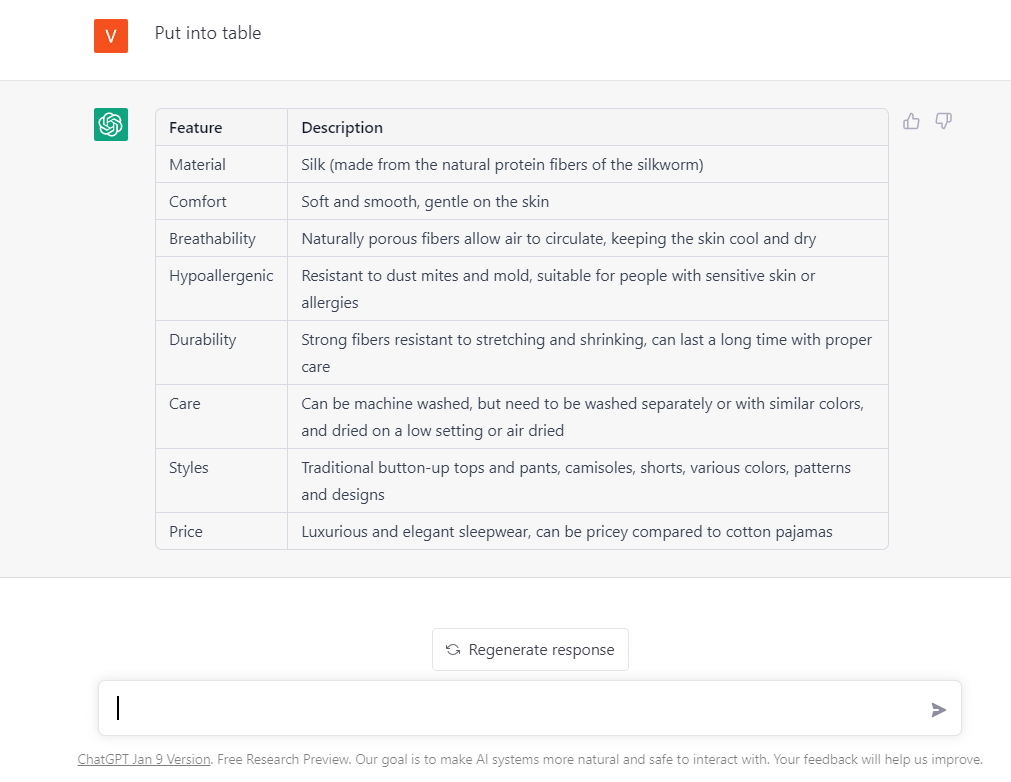
2. Easier Keyword Research
As any content writer knows, keyword research takes up a lot of time. Using an AI tool like ChatGPT can make it easier. SEO tools like SEMRush and Moz cost a lot of money, so it’s possible to save money and time via ChatGPT.
Below is a screenshot of me finding keywords for “silk pajamas”. It isn’t capable of giving in-depth keyword research, however, if you need some keywords fast, this isn’t a bad way to go.
When choosing a keyword to write an article about, make sure to do in-depth keyword research — don’t simply use an AI tool to generate potential keywords for you.
Here’s an example of using ChatGPT for generating keywords:
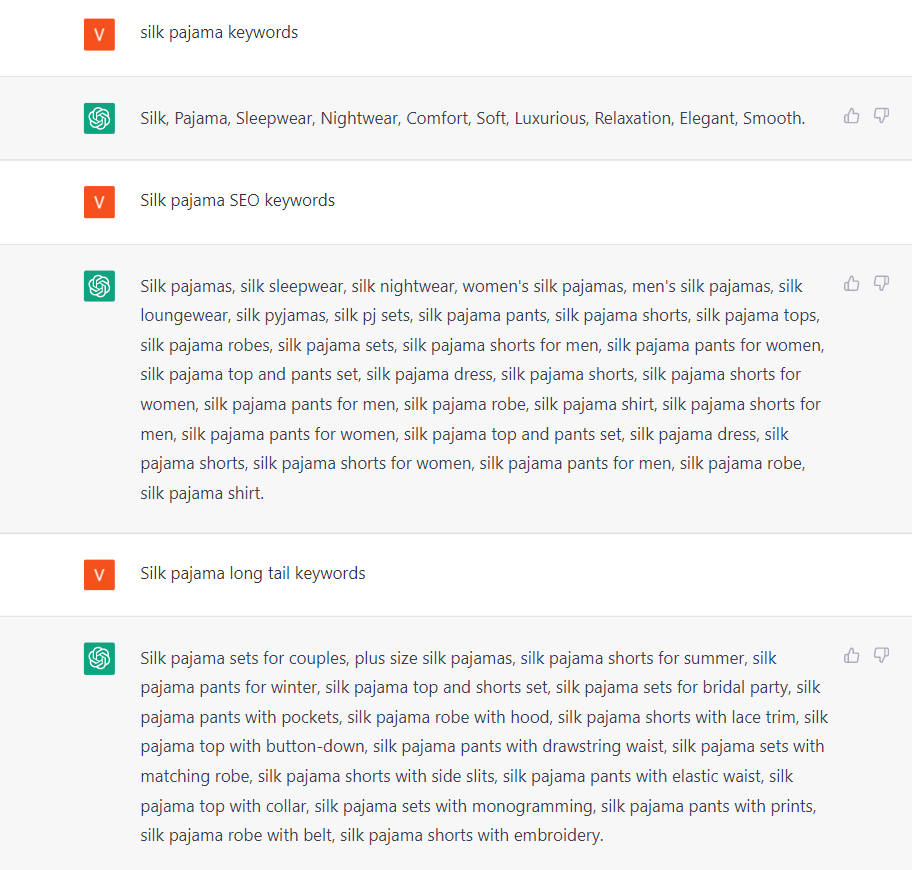
3. Facilitating On-Page SEO Tasks
The main way I’m seeing a lot of SEO professionals use ChatGPT is for generating headlines and meta descriptions. It’s a pain to craft the perfect headline and meta description to boost the CTR, so I understand why many are outsourcing this to AI.
Here’s what ChatGPT gave me for a silk pajama keyword meta description:
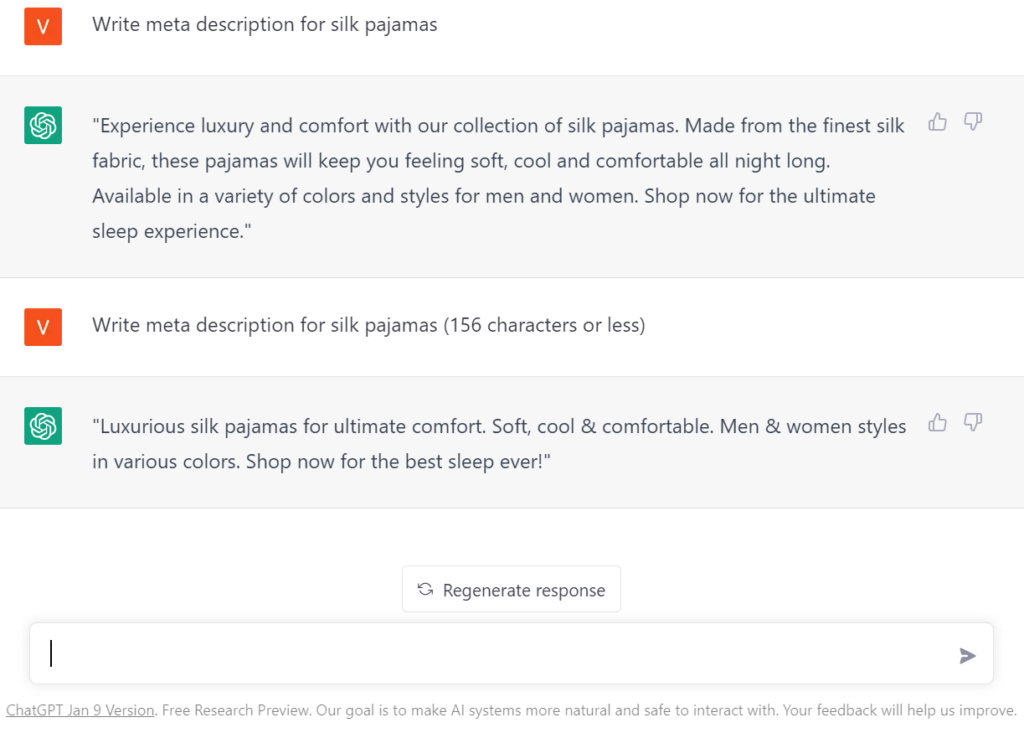
Here’s what ChatGPT generated for potential silk pajama headlines:
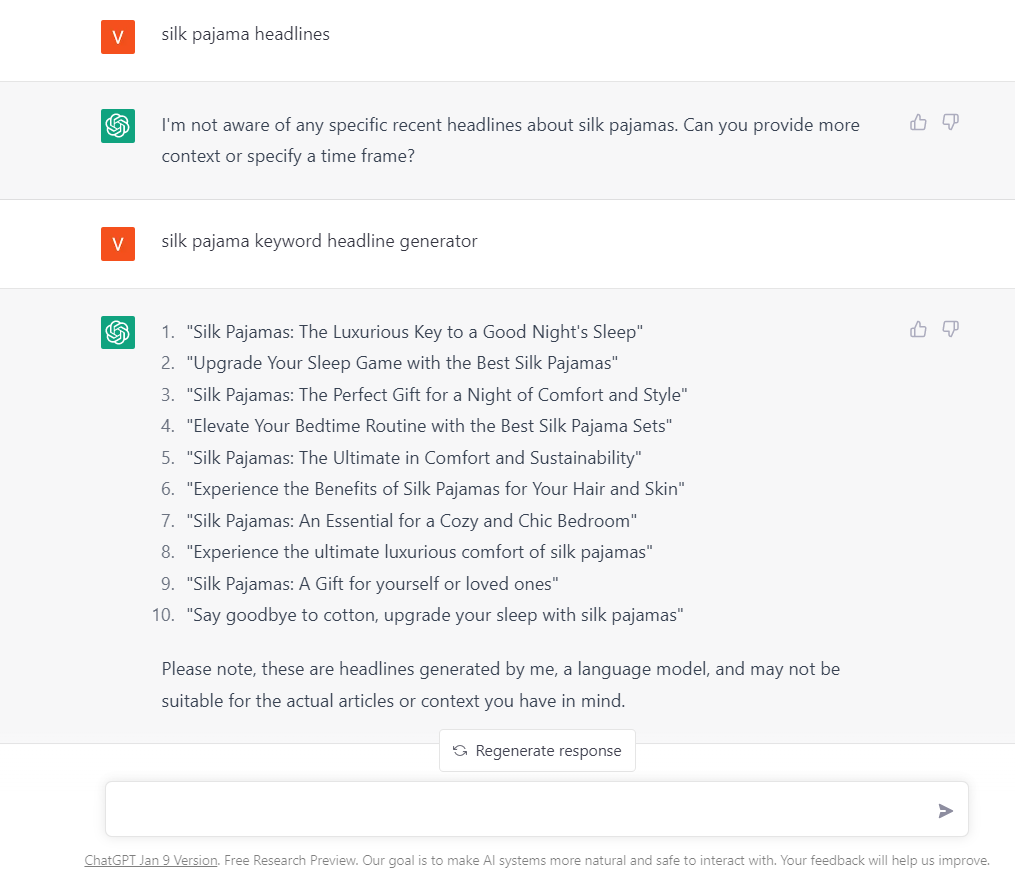
Overall, not bad suggestions for meta descriptions and engaging headlines.
4. Generating Analytic Reports
A big part of SEO is analyzing reports and data from the website, and ChatGPT can make this easier.
Google business tools are infamous for their complexity (looking at you, Google Analytics 4). ChatGPT offers an opportunity for those without the knowledge to leverage these tools.
Here is a screenshot of me asking ChatGPT to create Python code to create a data table:
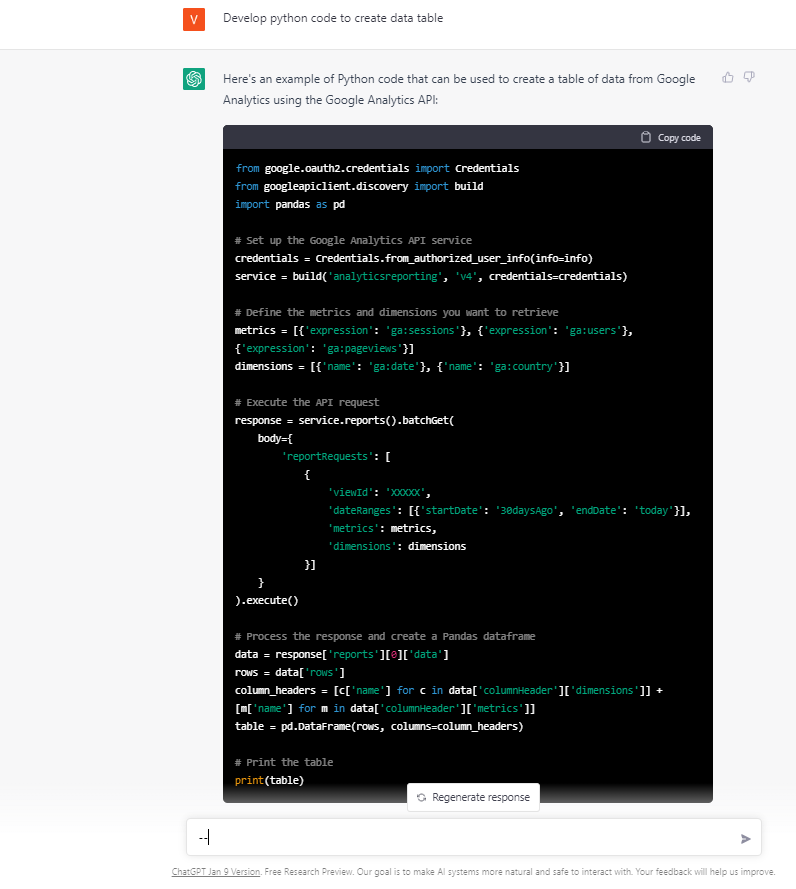
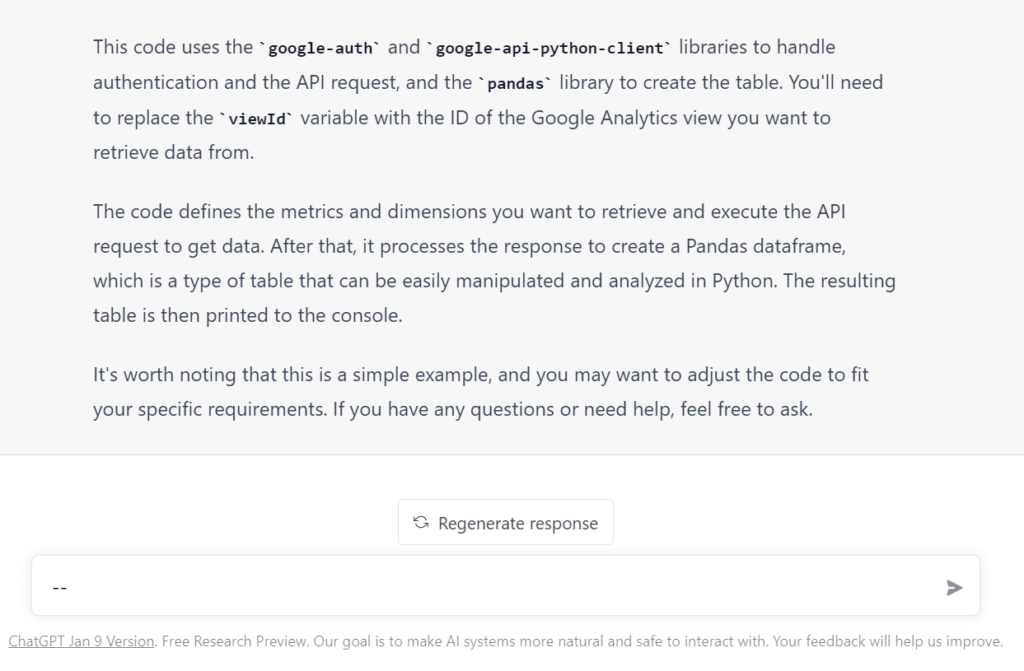
ChatGPT For SEO: The Darkside To This New Tool
Overall, I think ChatGPT is groundbreaking and cool. It definitely has the potential to revolutionize SEO. However, there are 3 big reasons not to use ChatGPT for SEO.
To be clear, I’m not currently using ChatGPT due to copyright concerns. In the future, I think it would be a wonderful way to leverage SEO, but the potential pitfalls far outweigh the potential time saved.
1. ChatGPT Is Too New
I do enjoy trying out new technologies, especially when it comes to SEO tools. However, the purpose of technology is to save you time — ideally enough to justify the purchase and learning how to use it.
Though ChatGPT gives quick responses, it’s just too new to abandon your old tools and use it wholeheartedly. It’s still going through testing, and there’s no telling how the algorithm can change in the future.
Auto-generated content via AI is a new ballgame, and we don’t fully understand its impact on SEO right now. There’s a good chance search engines like Google can change their own algorithms to battle AI content, which defeats the purpose of using ChatGPT in the first place.
2. Copyright/Plagiarism Concerns
No one should be plagiarizing anything, but there are people out there who do this for a living. Except now, they have the power of AI at their fingertips. Tying into the point above, I wouldn’t get too dependent on ChatGPT because search engines will update their algorithms to take into account illegal and spammy practices.
When using it for generating headlines and meta descriptions, I had to triple-check that there was no plagiarized content. And several times, I saw that there was too much of an overlap between suggested keywords/headlines/meta descriptions and the results in the search results.
This ends up with users having to manually check ChatGPT’s output against results already out there. And since the entire point of AI is to hone an algorithm from already existing content, it’s a part of this software that can’t be overlooked.
This is my biggest ChatGPT concern. The fact that ChatGPT outright states that there are copyright and legality issues of using ChatGPT content:
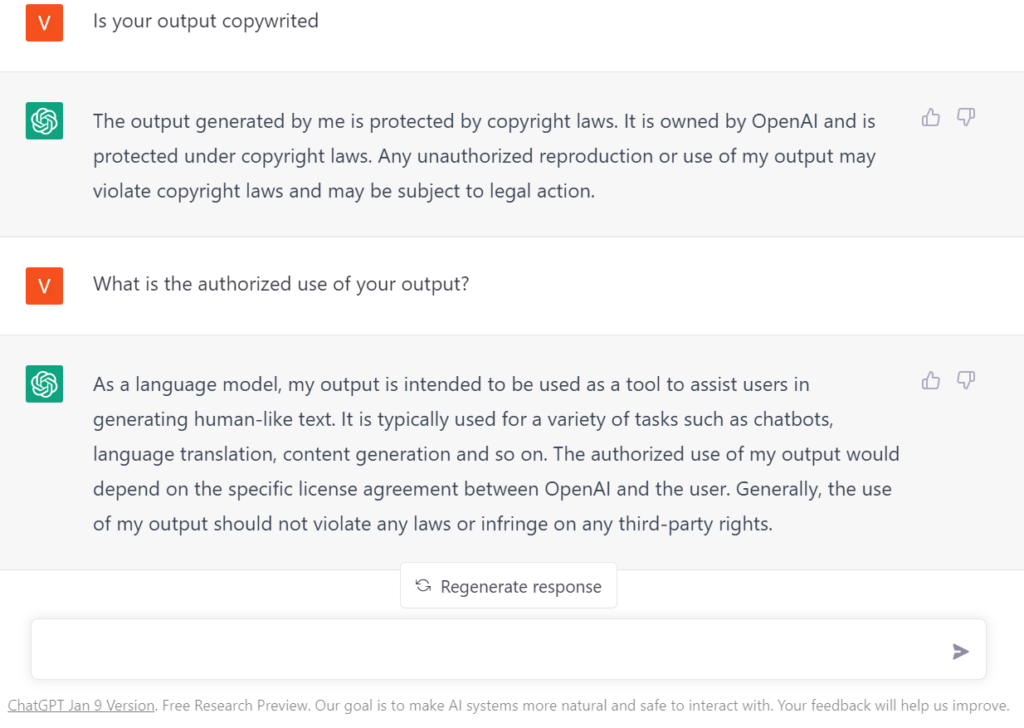
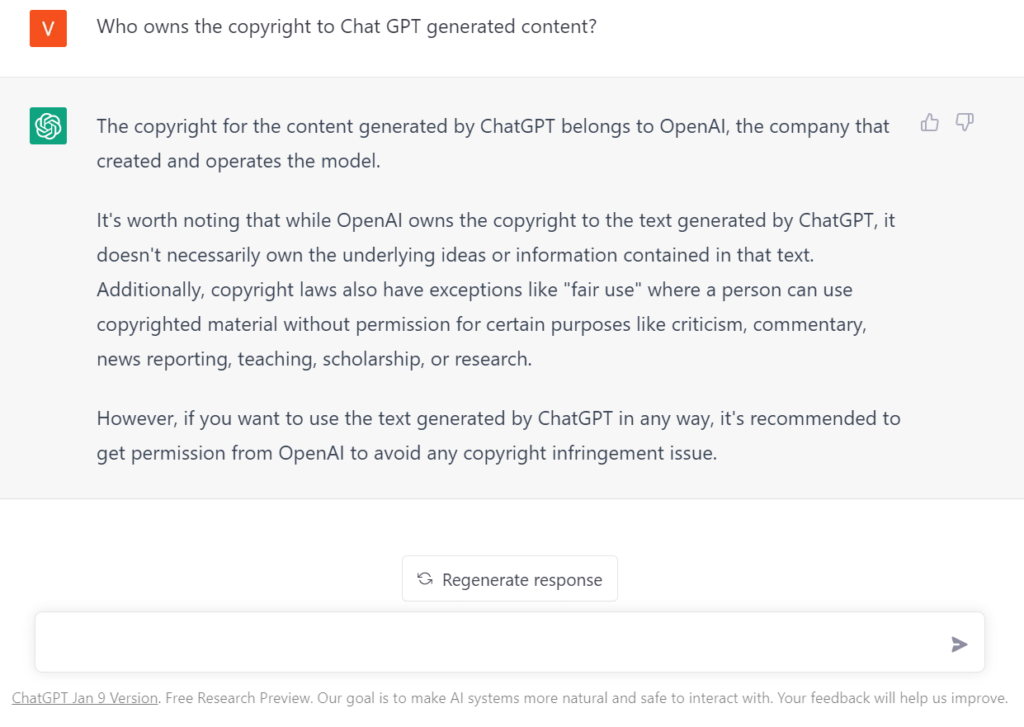
The Takeaway
In short, as cool as the concept of AI is, I’m not too impressed with it at the moment. It’s too new for me to have a strong opinion on it.
I played around with ChatGPT for a few days, and while it does save time sometimes, I have to pick through a lot of…unsatisfactory results.
If I were to use it, it would be for something like auto-generating several possible meta descriptions or looking up keywords. And I definitely wouldn’t use it for content writing, due to the possible copyright nightmare. Since this is new, I trust my regular SEO process (which doesn’t need to be cautiously triple-checked) a lot more than OpenIA.
So, it’s mainly copyright concerns, along with the question of whether or not it will actually save time while providing high-quality work.
I don’t use ChatGPT for providing SEO services. If you’re interested in scaling your company, growing your organic traffic, and increasing your market share, check out my about page for more information.
